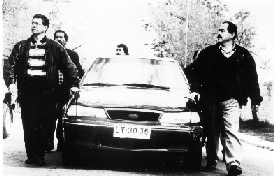
Hearing only the official version, a generation of young Chileans has grown up with little knowledge of the historical facts surrounding the events of September 11, 1973. On that day Salvador Allende's democratically elected government was overthrown in a bloody coup by General Augusto Pinochet's army.
Patricio Guzmán's landmark film The Battle of Chile (1976) documented the "Popular Unity" period of Allende's government, the tumultuous events leading up to the coup, and Allende's death. But the memory of those times and events, captured so powerfully in The Battle of Chile, was largely barred from the collective consciousness of the Chilean people.
Now, Guzmán has returned to show The Battle of Chile in his homeland for the first time, and to explore the terrain of the confiscated (but maybe reawakening) memories of the Chilean people.
CHILE, OBSTINATE MEMORY visits with Chileans who experienced the coup first-hand (some of whom are seen in The Battle of Chile from 25 years ago). Survivors reminisce as they watch that film, recognizing lost comrades and recalling their courage, gaiety and love of life. Those who were not killed during the coup itself were crowded into the National Stadium in Santiago, where many were tortured, disappeared, and never seen again. Survivors talk about the terror that characterized the Pinochet regime until the dictator was finally obliged to relinquish power.

On the streets of Santiago a group of young people are seen marching and singing the Unidad Popular anthem from the time of Allende. Looks of uneasy surprise can be seen on the faces of passers-by. They have not heard this song in almost a quarter century. A quarter century of censorship and self-censorship, buried memories and controlled grief.
In the end it is to students such as these that Guzmán shows The Battle of Chile. The surprising intensity of their reaction reveals an unquenchable thirst for truth about the past. Their confusion is palpable. Through them, the repressed feelings of an entire nation seem to find expression. They are the Chile of tomorrow.
"The disquieting juxtaposition of a past so indelibly etched in the minds of one generation and a youthful population oblivious to history lends the film a haunting quality. Pic's subtlety should earn it major accolades."—Variety
"Through a careful selection of images and convincing montage, [Guzmán] makes it possible to grasp the themes of memory and forgetting through non-verbalmeans."—DOX
Also reviewed in H-Net Reviews in Humanities and the Social Sciences
1998 Award of Merit in Film, Latin American Studies Association
Grand Prize, 1997 Florence Film Festival (Italy)
Public Choice Award, 1997 Vue sur les Docs (France)
Second Coral Prize (Documentary Category), 1997 International Festival of New Latin American Cinema (Havana, Cuba)
1998 Sundance Film Festival
1998 New Latin American Film Festival, UCLA
1997 Toronto International Film Festival
